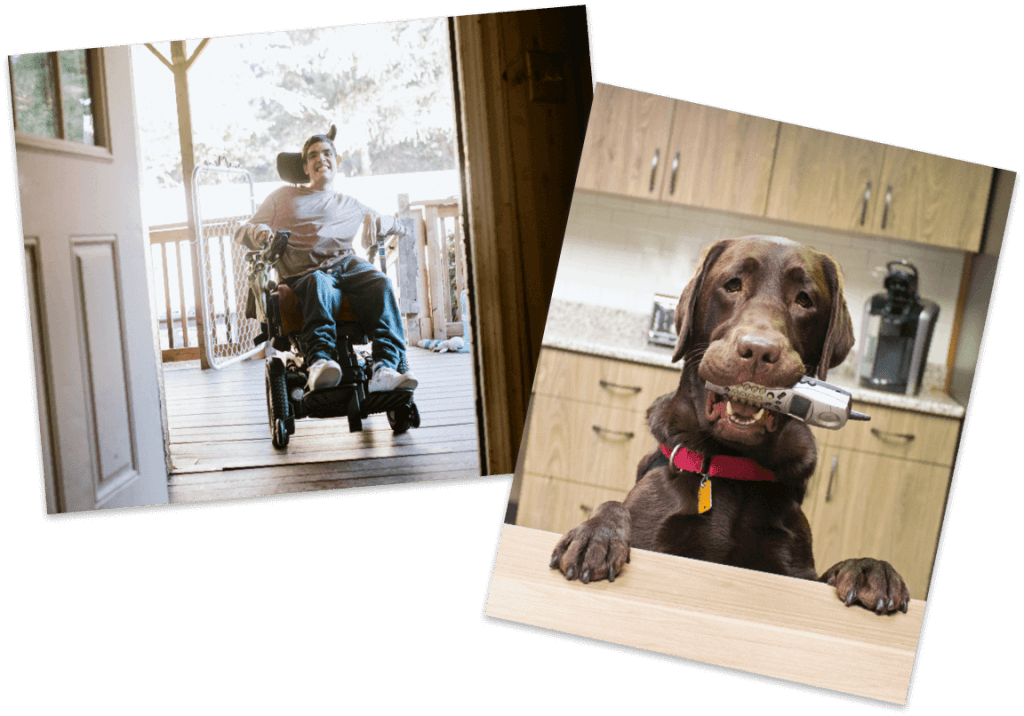As the U.S. population skews increasingly older, the need for in-home care (both non-medical and medical) and assisted living continues to rise. In fact, recent census data shows that one in five people will have reached retirement age by 2030. People with disabilities also need access to support services and care, whether at home or in a facility.
In this blog, we’ll take a closer look at in-home care vs. assisted living facilities to help you make the right choice for you or a loved one. We’ll also review the services provided by Independent Living Services (ILS) and the benefits of being an ILS caregiver.
What is In-Home Non-Medical Care?
In-home non-medical care allows seniors and people with disabilities to live comfortably and securely in their own homes for as long as possible. Because it isn’t medical in nature, these services are typically provided by trained aides. However, certified nursing assistants (CNAs) may also offer these services.
Unlike in-home healthcare, in-home non-medical care doesn’t need to be prescribed by a doctor. Instead, you can use an agency to find the right caregiver for you or conduct your own search. Medicaid, government programs, and veteran benefits may cover in-home non-medical care, but most people pay privately.
What Does In-Home Non-Medical Care Include?
In-home non-medical care includes a comprehensive suite of services, including the following:
- Assistance with bathing, dressing, and grooming
- Companionship
- Escort to appointments
- Laundry and light housekeeping
- Meal planning and preparation
- Medication reminders and prescription pickup
- Overnight monitoring
- Respite for family caregivers
- Shopping and errands
- Transportation assistance
Is In-Home Non-Medical Care Right for You?
Many people can benefit from in-home non-medical care, including seniors, people with disabilities, individuals recovering from surgery, and those with chronic illnesses. Ultimately, if you need assistance with activities of daily living, you’re a candidate for in-home non-medical care.

What is In-Home Healthcare?
Unlike in-home non-medical care, in-home healthcare is provided by trained medical professionals (like CNAs and physical or occupational therapists) with state-approved licensing. Some providers even specialize in certain conditions or diseases, allowing them to provide the highest levels of care.
Registered nurses (RNs) and licensed practical nurses (LPNs) also offer in-home healthcare, but this is typically reserved for people with more serious conditions. These include multiple sclerosis (MS), amyotrophic lateral sclerosis (ALS), spinal cord injuries, and traumatic brain injuries, among others.
In-home healthcare must be prescribed by a doctor, and you’ll typically receive care on a set schedule that’s based on your provider’s recommendations. Are you wondering, “does Medicare cover in-home care?” Since it’s prescribed by a doctor, in-home healthcare is typically covered by Medicare or private insurance. It may also be included in your Medicaid or veterans benefits, but this varies widely.

UDS Can Help You Live A Fuller Life With Our Comprehensive Services:
Planning & Support – Our dedicated planning & support teams help manage the care and services you need.
Personal Care & Independence – We’ve helped people with disabilities live more independently in their own homes since 1965.
Enrichment & Life Skills – Our variety of programs is dedicated to building skills for living well with a disability.
What Does In-Home Healthcare Include?
In-home healthcare encompasses a variety of services that include (but are not limited to) the following:
- Administering injections and medical tests
- Catheter, colostomy, feeding tube, tracheostomy, and ventilator care
- Medical social work
- Monitoring vital signs
- Pain management
- Physical and/or occupational therapy
- Short-term nursing services
- Speech-language pathology
- Wound care
Is In-Home Healthcare Right for You?
A wide variety of people can benefit from in-home healthcare, including individuals who:
- Have just left the hospital or a skilled nursing facility
- Are recovering from a serious illness or injury
- Need monitoring after a significant medication change
- Have just completed a rehabilitation program
- Need physical or occupational therapy after an accident or illness
What Is Assisted Living?
Assisted living offers the same services as in-home healthcare, but in a community setting outside of one’s own home. According to the American Health Care Association & the National Center for Assisted Living, there are more than 800,000 Americans in assisted living facilities. Residents may need some assistance, but they’re typically more independent than people in nursing homes or skilled care facilities.
Most assisted living communities offer a continuum of service options that range from independent living to memory care. This allows residents to stay among familiar staff and friends as their abilities change. The specific amount you’ll pay each month depends on the amount of care you need to live a comfortable and fulfilling life, such as assisted living vs. 24-hour in-home care.
Services Provided by Assisted Living Facilities
Assisted living communities offer residents a variety of services that are tailored to meet their needs, such as:
- Assistance with bathing, toileting, dressing, and grooming
- Laundry and light housekeeping
- Meal plans and snacks
- Medication management
- Overnight monitoring
- Social programs and activities
- Transportation services
Additionally, assisted living facilities often have amenities located on-campus, including a:
- Beauty salon and/or barber shop
- Chapel
- Community garden
- Courtyard, patio, or deck
- Dining hall
- Fitness center
- Library and/or movie theater
- Pool and/or spa
- Private event space

Benefits of Assisted Living for Seniors & People with Disabilities
There are a multitude of benefits for individuals who choose to move into an assisted living community. First and foremost, assisted living offers a maintenance-free lifestyle with plenty of time to spend on the things you love. Here are a few more positives of assisted living:
- Receive a customized care plan that’s regularly evaluated by medical professionals to aid early diagnosis and better treatment.
- Bring furniture and other personal items with you to make your space feel like home.
- Enjoy a community environment that decreases feelings of isolation and loneliness by encouraging participation in social events.
- Receive around-the-clock care from a trained staff that’s immediately available in case of an emergency.
- Count on reliable transportation to medical appointments and grocery stores without having to worry about driving or maintaining a vehicle.
- Partake in nutritious – yet delicious – meals and snacks that are designed to promote a healthy lifestyle.
Assisted Living Communities Compared to Other Facilities
“Assisted living” can sometimes feel like a catch-all term, so it’s important to differentiate these communities from other types of facilities. We’ll take a closer look at the most common ones below.
Nursing Homes
Nursing homes are intended for people who need higher levels of short- or long-term medical care. Residents receive full-time care from trained medical staff, and many of them have ongoing physical or mental conditions that require constant supervision.
In some cases, people may stay at a nursing home for a short period after a hospitalization before returning home. Many of these facilities offer occupational, physical, and speech therapy to short- and long-term residents. Nursing homes are licensed by Medicare and/or Medicaid and are more expensive than assisted living facilities because they provide advanced medical services.
Memory Care Facilities
Memory care facilities provide specialized care and support for people with memory loss. Employees receive regular training in dementia and Alzheimer’s care to help them manage the difficult behaviors associated with these illnesses. Memory care facilities have locked entrances and are designed to prevent wandering. Like nursing homes, memory care is more expensive than assisted living due to its specialized nature.
Board & Care Homes
Also known as residential care facilities or group homes, these small communities usually have no more than 20 residents. While medical care often isn’t provided on-site, residents receive personal care and meals from an around-the-clock staff. Most board and care homes also offer social activities and programs that are specifically designed for people with disabilities.
Independent Living Facilities
Independent living facilities are perfect for people who are able to live on their own, but enjoy the convenience and fellowship of a community setting. While this option doesn’t provide assistance with ADLs, it does typically include laundry, housekeeping, and transportation. Due to its hands-off nature, independent living is typically less expensive than assisted living.
How to Choose the Right Assisted Living Facility for You
The first step in choosing an assisted living facility is asking yourself why you want or need to change your living situation. Which activities of daily living (ADLS) do you struggle with? How often do you need assistance? As you visit different communities, be sure to keep the following in mind:
- Do you want to stay in the area you currently live in or move to be near family members?
- Which services do you need to live a fulfilling and independent life?
- What kind of training and certifications do the facility’s staff have? Are they friendly and knowledgeable?
- Does the facility have amenities that are important to you?
- Are there a variety of social activities that will keep you engaged?

Ways to Pay for Assisted Living
Curious about the cost of in-home care for the elderly or people with disabilities? The fees associated with assisted living vary based on the size of your residence, community amenities, and the specific services you need.
In most cases, your base price includes housing, utilities, light housekeeping, meals, transportation, and social activities. While some facilities are all-inclusive, others may charge for additional services on an a la carte basis.
Paying for assisted living may seem daunting at first, but there are a variety of ways to fund the cost of assisted living vs. in-home care. These include:
- Bridge loans
- Home and community-based services (HCBS) waivers
- Home equity
- Life insurance
- Long-term care insurance
- Medicaid
- Medicare
- Private pay
- Veterans benefits
Now that you know the difference between in-home care vs. assisted living facilities, you’re ready to make an informed choice for you or your loved one. Remember that our Customer Care Representatives are well-versed in all of your payment options, so they can help you decide which method is best for you and can assist you in obtaining any available funding.
Choose Independent Living Services for Your In-Home Care
Independent Living Services (ILS) offers a variety of in-home non-medical personal care for seniors, veterans, and people with disabilities. Our caretakers are dedicated to enhancing your independence by helping you live a more fulfilling life in the comfort of your own home.
We also offer personal care and support services to individuals in assisted living communities, retirement homes, and skilled nursing facilities. Whether you need us for a few hours a day or around the clock, ILS can provide the services you need.
Why Trust Your In-Home Care to Independent Living Services
There are many reasons to choose Independent Living Services for your non-medical personal care. Here are a few of the biggest benefits of trusting us with your care:
- Our Care Managers work with you to create and implement an independent living plan that meets your unique needs.
- Our caregivers are trained, bonded, insured, and receive criminal, fraud, and child abuse background checks.
- There are no long-term requirements or upfront costs, and we bill on a monthly basis.
- We can help you make financial arrangements that maximize the utility of any medical care funds, trusts, or settlements available to you.
- We provide comprehensive home assessments that identify your specific livability and safety needs. We can also help you obtain home medical equipment or plan for accessible home modifications.
Become An Independent Living Services Caregiver
Are you looking for an exciting career that offers the ultimate personal fulfillment of helping others? Consider becoming a caregiver for Independent Living Services! There are many reasons to become an ILS caregiver, including:
- Flexible part-time employment with the ability to work days, evenings, and weekends.
- Competitive wages and the option of participating in a 401(k).
- Paid initial orientation and access to ongoing paid online training modules.
- On-staff Safety Mentor to handle any questions or concerns you may have.
- No experience is necessary.
- Opportunities for career advancement.
- Ability to care for family members if needed.